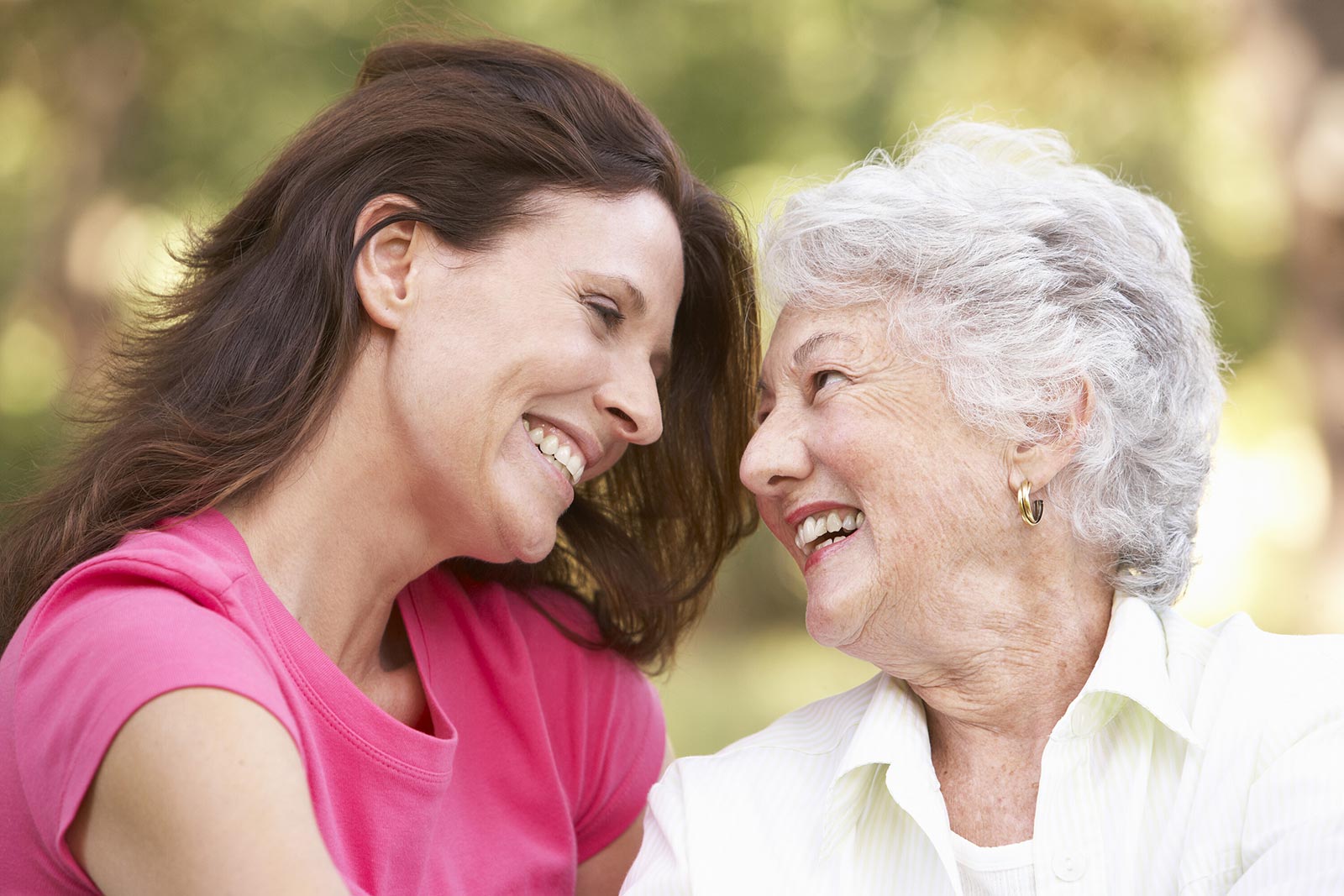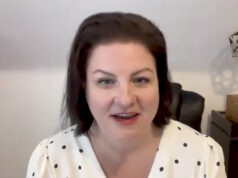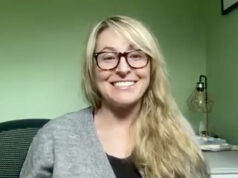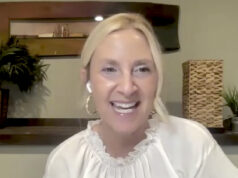11 million caregivers are caring for a senior loved one who has dementia in America. Allyson Schrier joins Suzanne to talk about their typical day. While everyone is different, those living at home with a loved one in mid- or late stages of dementia face some consistent themes.
As a caregiver, you have a lot on your mind, and are often exhausted, on edge, not getting much sleep. There’s an unpredictability of what your loved one might want to do or might say. In Allyson’s case, it was a daily challenge to help her husband retain his dignity and accomplish the tasks he needed to do without making him feel like he was being treated as a child — not just being cared for, but being supported. She highly recommends learning how to be a more effective caregiver and provides a number of excellent resources for people to check out.
Allyson co-developed Zinnia TV, a positive, nurturing, inspiring app and a therapeutic caregiving tool for those in similar circumstances. Zinnia TV subscriptions are just $6.99/month, or $69.99/year, with a two-week free trial. Learn more at Zinnia TV.
Suzanne: Welcome back everyone to Answers for Elders Radio Network. And we are here with Allyson Schrier, my wonderful friend. I am so honored to share you with our audience. And Allyson is the CEO and founder of Zinnia TV. Allyson and I have been talking about her amazing, I guess TV channel, which is not even a channel. It’s got programming — programs underneath its umbrella, but it gives people that are dealing with dementia something to watch that’s good for them, that is inspiring, that’s nurturing, that’s positive and it helps the brain that is dealing with a dementia or a brain, you know, memory loss, the ability to track. And I think that’s what’s really important, Allyson. Welcome back to the show.
Allyson Schrier: Thank you, so good to be here.
Suzanne: I’m going to ask you a really just a general question. What’s a typical day like for a caregiver that lives at home with a loved one who has mid- to advanced stages of Alzheimer’s? I know it’s kind of a general question.
Allyson Schrier: Yeah. You know, of course, all dementias are different and all people living with dementia are different. So I can speak primarily to my experience. That said, I do work with a lot of families, so I’ve heard lots of people’s stories. I would say that a consistent theme is always being a little bit on edge, being tired because a person who is living with dementia might have issues with sleeping. And as the care partner, you have a lot on your mind and might not be getting the best sleep every night, you might have somebody who’s getting up in the middle of the night. My husband would get up and start putting on his clothes or start taking a shower at three o’clock in the morning, because he was just confusing day and night time. And so, in a typical day, I would be really conscious of the fact that I had things that needed to get done.
And now, bear in mind, it was a little different for me because I had kids at home. So, taking care of them and taking care of him and always being in, in his case, a little bit on edge, because I never knew exactly what was going to happen. There’s this unpredictability that kind of keeps one on edge a bit. So it might be that he starts looking at his phone and he can’t do the thing that he needs to do. So he suddenly starts getting very upset or it might be that we are sitting at the breakfast table and he says something that is just wildly inappropriate for a 12 and a 15 year old to hear, and I need to suddenly kind of like bring things back to normal. It’s about trying to figure out how do I respectfully allow him to maintain his dignity as we try to get through the day and help him accomplish the tasks that he can no longer do without making him feel like he’s a baby and that taken care of instead of being supported. Being consciously aware of not just his emotional and social needs, but also his physical needs. Like, wow, has he been to the toilet yet? Do we need to go to the toilet? He’s starting to smell a little bit, starting to get a little upset, because I’m not sure how that shower is going to go.
Feeling like you don’t have enough time to do all of the things that you need to do. You don’t get a lot of breaks because many people find that their person who’s living with dementia is um lives in a state of underlying anxiety because you’re not quite sure about the world, right? The world doesn’t make sense anymore and you my caregiver or my anchor. And so I’m going to follow you everywhere that you go. I might take the initiative to start doing things on my own that are dangerous to me or to the house. And so therefore, as the care partner, caregiver, um, we are vigilant, hyper vigilant about what are they doing when they’re with us, it slows us down and keeps us from being able to do all the things that we need to do. We’re constantly worried about what are they doing and what trouble might get into.
Suzanne: My mom had vascular dementia and it wasn’t extreme by any means, but there was still this situation of… when the house cleaner would come in to the house to help clean the house, she was insistent that they’re snooping through her things and it’s like mom, they’re not, but it’s like, how do you deal with that kind of tension? It’s constantly like she, they see things in a totally, like, where did you come up with this mom? You know? I don’t know. But that’s the thing, I think Allyson, what you’re talking about, I think in many ways there’s this vigilance of, you know, not only do I allow her her dignity, but on the other hand, we have to let the person come in and, you know, and clean the house or we mom, you have to go take a shower. No, I’m not going to take a shower. Yes. Well, how can we get, you know, how do we do this? So, we’re constantly trying to reinvent ourselves in the situation or, you know, trying new techniques to convince… and it’s really, really this constant thing of, well, maybe this will work well, maybe that will work. So it’s just all this uncertainty and getting overwhelmed.
Allyson Schrier: What you are reminding me of — first of all, I’m sort of getting a little stressed out even talking about it! But one of the things that’s so important is caregiver education. So there actually are techniques — there are tools and techniques that allow us to lower our own anxiety while supporting the person who’s living with dementia. I think for a lot of people, they run into trouble when they try to change things, and they also have in the background, they just keep thinking that this person could do better if they only tried harder, like they blame them, right? They feel like there’s something that willful about their actions, and there’s not. This is a person whose brain isn’t working. So in this pairing of the caregiver and the person who they’re caring for, somebody’s gotta change. And it needs to be the person whose brain is working.
So, therefore, I highly recommend that people who are in a position of being a caregiver, learn how to be a more effective caregiver. So I think of sites like… now, of course, as you cited, there are so many caregivers, it’s not just about caregivers with dementia. So there are 11 million people who are giving care in the United States to people with dementia specifically. But there are many more people caring for people with different types of issues. But I think of places: the UCLA has fabulous videos that are about how to teach you how to give better care. DSHS here in Washington State has a website that’s filled with resources. Everybody who’s living with dementia should know about Tepa Snow, right? She has a YouTube channel. And her TikTok stuff is pretty amazing, if you are comfortable with that format. So I really do highly, highly recommend also joining a support group, so that you can get tips and tricks from other people.
Suzanne: We’re gonna be coming back this next segment and talk about a little bit about how Zinnia TV can help not only those that are dealing with dementia, but also the family caregiver, care partner. And Allyson, it’s so great to have you on the show and we’re looking forward to having you back next segment right after this.













